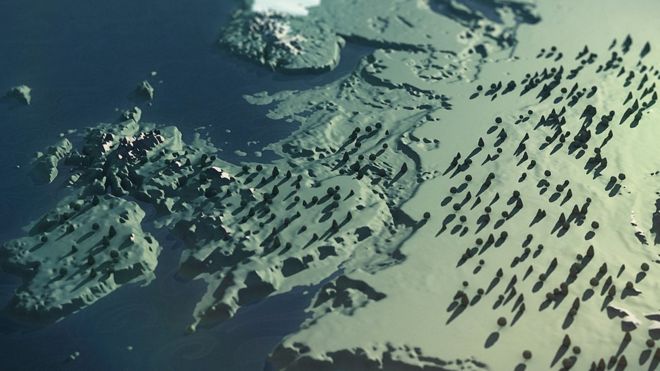- 19 August 2015
- From the section Science & Environment
Have
we underestimated the first people to resettle Britain after the last
Ice Age? Evidence from a variety of sources suggests that early Britons
were more sophisticated than we could have imagined.
Archaeologists once thought that the story of the early hunter-gatherer Britons was lost to the mists of time. The hunter-gatherers left almost no trace of their nomadic existence behind.
As a result, the stone-age settlers of ancient Britain were thought of as simple folk, living a brutal hand-to-mouth existence.
But now, evidence is emerging that turns those assumptions upside down. Archaeological sites all over the UK and northern Europe are producing evidence that paints these people in a very different light.
Thanks to this cutting-edge science, we now have an increasingly clear picture of prehistory, and the adaptable, culturally rich, and sophisticated people who inhabited these islands.
A BBC Horizon documentary, to screen on Wednesday, tells the story of this quest to understand the first Britons.
Some of these Mesolithic, or Middle Stone Age, people lived at Blick Mead, Wiltshire - a few miles away from the future site of Stonehenge.
Here, groups seem to have managed and cleared rich forests, built structures and returned to the same place for over 3,000 years, according to a radio carbon date range that has yielded a uniquely long sequence for any Mesolithic site in Britain and Europe - 7,596-4,246 BC.
The springs at Blick Mead may have been the initial and practical reason why people lived there long before Stonehenge was built.
The quantities of flint tools and animal bones, especially from extinct wild cattle known as aurochs, point to people living here for long periods of time and there being long-term special memories and associations with the place.
The types and variety of flint seem to reflect the movements of people who followed game with the seasons, and chose to stay in different areas according to the changing availability of plants for food and materials, and the needs for shelter.
Taken together, the flint and other stone tool evidence suggest that Blick Mead was a feasting and gathering place for thousands of years that people travelled large distances to reach. Far from it being a place nomads dropped into once in a while, time would have been spent there, ideas exchanged and new technologies discussed and adapted.
Hunter-gatherers prospered in Britain, but then, 6,000 years ago there was a dramatic and permanent change in the way our ancestors lived their lives. So dramatic in fact that it's been given a different historical name. This was the start of the new Stone Age in Britain - the Neolithic.
Scientists and archaeologists have begun to uncover evidence that local hunter-gatherer ways survived the arrival of farming rather than being extinguished, as is often depicted.
And at Blick Mead, where rare evidence of hunter-gatherer life is so well preserved, finds include bones of mice, toads and fish - we can also discover more about the origins of Stonehenge.
Excavations at the site are showing that people were living in the area from the time of the first monuments to be built at Stonehenge.
We have always thought of Mesolithic people, the first Britons, as hunter-gatherers, living a nomadic life, primitive and precarious. But what has been recently revealed at Blick Mead, and elsewhere, is the existence of a much more complex, dynamic society.
The dramatic discoveries at Blick Mead are only partly important because they provide the back story to the Stonehenge story; they are also important because they reflect the growing importance of these peoples to British history generally.
And these earliest British stories are showing that the Mesolithic was a defining period in the history of these isles.
HORIZON - First Britons is on BBC Two at 20:00 on Wednesday 19 August.






0 comments:
Post a Comment